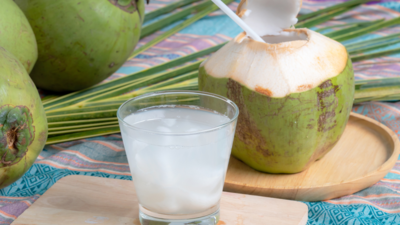
Coconut water is often hailed as a natural superdrink, low in calories, rich in electrolytes, and perfect for post-workout hydration. From improving skin health to supporting digestion, its benefits are widely promoted. However, this tropical beverage isn’t suitable for everyone. For people with certain medical conditions like diabetes, kidney disorders, high blood pressure, or food allergies, coconut water may cause more harm than good. It’s important to understand when this drink might interfere with your health. According to studies, here’s a detailed look at who should avoid coconut water and why, based on scientific research and expert recommendations.
Think twice before drinking coconut water: 6 groups who should avoid it
People with diabetes should be cautious
Coconut water contains natural sugars, usually around 6–7 grams per 200 ml serving. While this is less than what’s found in fruit juices or soft drinks, it can still affect blood glucose levels. For people with diabetes or insulin resistance, this natural sugar may lead to spikes in blood sugar, especially if consumed regularly or in large quantities.If you’re managing diabetes, it’s best to limit or avoid coconut water or consult a healthcare professional to determine a safe amount for your diet.
Those prone to allergies should stay alert
Although coconut allergies are relatively rare, they can still cause significant reactions in sensitive individuals. Symptoms may include itching, hives, swelling, and skin redness shortly after consuming coconut water or coconut-based products. In more severe cases, individuals may experience respiratory issues, digestive discomfort, or even anaphylaxis.According to a study published in Asia Pacific Allergy, around 90% of children with coconut allergy presented with skin-related symptoms, while nearly 10% developed anaphylaxis involving multiple organ systems.Another review published in Allergologia et Immunopathologia also confirmed cases of coconut-induced anaphylaxis, particularly in children, identifying certain coconut proteins as allergenic triggers. If you have a known history of food allergies or sensitivities, it’s important to stay alert when consuming coconut water. Seek medical advice if any unusual or severe symptoms appear after intake.
Not suitable for people with kidney disorders
Coconut water is rich in potassium, a mineral that plays an important role in maintaining fluid balance and heart function. But for people with chronic kidney disease (CKD) or poor kidney function, high potassium intake can be dangerous.When kidneys are unable to filter potassium efficiently, it builds up in the blood, leading to hyperkalemia, a condition that can cause muscle weakness, nausea, and even life-threatening irregular heart rhythms.If you have any kidney-related condition, especially at moderate to advanced stages, you should avoid or strictly limit coconut water after discussing it with your nephrologist.
May not be ideal during cold or flu
In traditional health systems like Ayurveda, coconut water is considered to have a naturally cooling effect on the body. While this is beneficial in hot climates or during summer, it can be problematic if you’re suffering from a cold, cough, or flu.Consuming coconut water when you’re already experiencing symptoms like nasal congestion or throat irritation may worsen your condition or delay recovery. If you’re prone to frequent colds or have a weak immune system, consider skipping coconut water during winter or illness.
Be careful if you have high blood pressure
Coconut water is often promoted as a heart-healthy drink due to its high potassium content, which can help lower blood pressure by counteracting the effects of sodium. However, this very benefit can become a risk for people taking blood pressure medications, especially ACE inhibitors or potassium-sparing diuretics.These medications already help the body retain potassium, and adding coconut water on top of that may cause potassium levels to rise too high, a condition known as hyperkalemia. This can lead to symptoms such as chest pain, nausea, muscle weakness, or an irregular heartbeat.If you’re managing hypertension (high blood pressure) with medication, speak with your doctor before consuming coconut water regularly. While it may help in some cases, unsupervised use could create complications.
Avoid if you’re on an electrolyte-restricted diet
If you’ve been prescribed a low-potassium or electrolyte-controlled diet, such as in cases of heart disease or advanced kidney issues, coconut water may not be a suitable drink. The combination of potassium, sodium, and magnesium in it can disrupt your electrolyte balance if not carefully monitored. Symptoms of imbalance include fatigue, muscle cramps, and abnormal heart rhythms. Always read nutrition labels and follow the dietary guidelines set by your doctor or dietitian.Coconut water is undeniably a healthy beverage for many people. It hydrates, nourishes, and even supports some aspects of heart and skin health. But as with any food or drink, it’s important to recognise that what’s healthy for one person may not be right for another. If you have diabetes, high blood pressure, kidney issues, food allergies, or are prone to colds or electrolyte imbalances, coconut water might not be the best option or at least should be consumed with caution.Also Read: Lutein for eye health: The powerful nutrient that could save your vision








